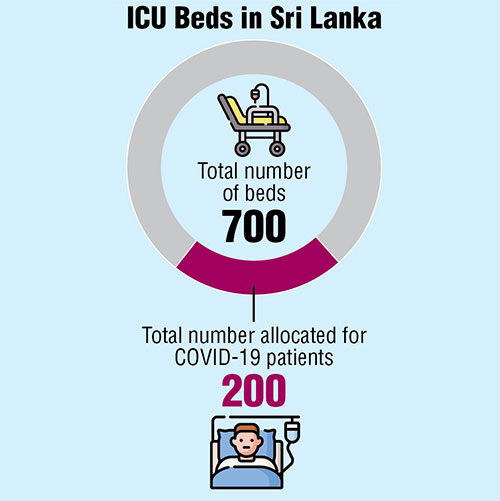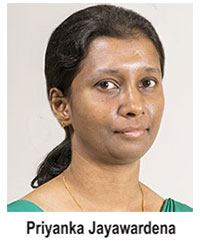Business
Bridging the Gaps: The COVID-19 crisis and Sri Lanka’s healthcare response

By Priyanka Jayawardena
Like many other countries, Sri Lanka faces numerous challenges in the battle against COVID-19. The pandemic has caused deep uncertainty and presented a colossal challenge for the country’s healthcare system. With the rapid increase in cases and the emergence of new variants, Sri Lanka began to face shortages of medical resources, including hospital beds and medical equipment.
 The vaccination programme was beset with a host of problems early on due to the irregular and inconsistent supply of vaccines, disorganised deployment and deviation from the scientifically agreed prioritisation. There was also alleged misreporting of COVID-19 daily statistics in the Gampaha district and Eastern Province. The absence of real-time data acted as a hindrance to obtain a reliable risk assessment in the country. Against this backdrop, this blog examines the gaps in the ongoing pandemic control programme and outlines ways to bridge these gaps so that more lives could be saved from COVID-19.
The vaccination programme was beset with a host of problems early on due to the irregular and inconsistent supply of vaccines, disorganised deployment and deviation from the scientifically agreed prioritisation. There was also alleged misreporting of COVID-19 daily statistics in the Gampaha district and Eastern Province. The absence of real-time data acted as a hindrance to obtain a reliable risk assessment in the country. Against this backdrop, this blog examines the gaps in the ongoing pandemic control programme and outlines ways to bridge these gaps so that more lives could be saved from COVID-19.
COVID-19 Vaccination Programme
By mid-August 2021, more than 12 million Sri Lankans (55% of the population) had been vaccinated with at least the first dose. Other than the delayed supply of vaccines, there were issues related to getting approval for vaccine use and the vaccination prioritisation process. Moreover, many people were seen queuing up at vaccination centres aggravating health risks due to the lack of a properly planned system for vaccine deployment and the lack of an online appointment system. More recently, the government has taken several measures to improve the rollout, including expediting the procurement process and improving administration with the support of the defence services.
Gaps in Pandemic Control
Sri Lanka’s rate of COVID-19 screening has remained inadequate to prevent the spread of the virus. Systematic surveillance is crucial for the rapid identification and detection of suspected COVID-19 cases. With newer variants found to be more transmissible and deadlier, there is a need to identify mutants and track the nature of transmission. Currently, the University of Sri Jayewardenepura is the only institution equipped with laboratory facilities to conduct genomic sequencing to identify new variants.
Countries like Singapore, New Zealand and Australia systematically monitor the pandemic through extensive testing and contact tracing. These countries are conducting 10-100 times more tests than other countries with a similar number of new confirmed cases. Sri Lanka’s extent of testing relative to the scale of the outbreak (positive rate was around 10%), is on par with Thailand and Malaysia but lower than India, Vietnam and Cambodia where the positive rate is below 5%.
Further, a major challenge to the existing healthcare system is inadequate ICU beds, ventilators, oxygen supplies and other necessities required to care for patients with severe respiratory failure. The availability of ICU capacity plays a crucial role in critical cases, and constant and uninterrupted availability of oxygen supplied beds is needed to avert a disaster. Currently, less than 200 ICU beds are in isolation units for patients with severe COVID-19 symptoms, whereas just around 700 ICU beds are available in the hospital system of the entire country.
Equally, it is vital to have timely access to real-time data so that meaningful insights can be drawn but due to capacity constraints and administrative issues, PCR test results are reported to be delayed. In some districts, the delays are said to be longer than one week. Thus, delays in generating test results are a grave concern and represent a major obstacle in the COVID-19 control process. There is a growing need for immediate and accessible healthcare and digital healthcare resources to effectively respond to the challenges posed by COVID-19. However, Sri Lanka’s health information systems are weak and under-funded and the lack of an adequate central health database and IT infrastructure has hampered digital health services.
Towards a Stronger Healthcare Response
The healthcare system has to be streamlined to ensure a successful vaccination deployment and a smooth inoculation programme with online appointments including over the phone appointment facilities. Parallel to an efficient vaccination programme, an enhanced screening capacity is needed for the rapid identification of COVID-19 cases. Sri Lanka’s overall COVID-19 screening capacity remains low; therefore, expanding testing and increasing the health sector’s capacity to identify new mutants is vital to curb the pandemic. Random PCR testing too must be carried out in densely populated areas which are prone to be contagious, thereby taking additional precautionary measures.
There is a growing concern about the availability of medical supplies in emergency contexts. Sri Lanka has to effectively leverage its limited resources in response to the pandemic. The crisis response has seen local innovation in the manufacturing of ICU beds and lab consumables and there is further scope to encourage local enterprise and innovation for this purpose. For instance, a team of Sri Lankan scientists recently invented a new PCR test kit using NANO technology, which is said to drastically reduce the testing time from two hours to half an hour. There is now an opportunity to encourage local innovation and local production through such efforts, where they contribute to efficiency gains.
Furthermore, a robust laboratory strategy, which includes laboratory networking, communicating real-time information on COVID-19, quality assurance and adequate workforce capacity is important for rapid detection and case management. South Korea, for example, practised the disclosure of real-time information on COVID-19 by the government via dedicated websites, mass media, phone messages and mobile apps. Digitalisation of healthcare and effective use of technology for sharing real-time data, contact tracing and surveillance and coordinating the efficient use of clinical resources are vital for successful pandemic control. It is also necessary to improve systems to manage real-time data and decision-support systems. Improved functional integration and coordination in treatment centres and laboratory services bring in many benefits.
*This blog is based on the comprehensive chapter on “Coping with Pandemics: Sri Lanka’s Healthcare System” in IPS’ forthcoming ‘Sri Lanka: State of the Economy 2021’ report.
Link to original blog: https://www.ips.lk/talkingeconomics/2021/09/02/bridging-the-gaps-the-covid-19-crisis-and-sri-lankas-healthcare-response/
Priyanka Jayawardena is a Research Economist at the Institute of Policy Studies. Her research interests include education and skills development, labour economics, inequality analysis, health economics and child nutrition. She holds a BSc (Hon) in Statistics and an MA in Economics from the University of Colombo, Sri Lanka. (Talk to Priyanka – priyanka@ips.lk)
Business
AHK Sri Lanka champions first-ever Sri Lankan delegation at Drupa 2024

The Delegation of German Industry and Commerce in Sri Lanka (AHK Sri Lanka) proudly facilitated the first-ever Sri Lankan delegation’s participation at Drupa 2024, the world’s largest trade fair for the printing industry and technology. Held after an eight-year hiatus, Drupa 2024 was a landmark event, marking significant advancements and opportunities in the global printing industry.
AHK Sri Lanka played a pivotal role in organising and supporting the delegation, which comprised 17 members from the Sri Lanka Association for Printers (SLAP), representing eight companies from the commercial, newspaper, stationery printing, and packaging industries. This pioneering effort by AHK Sri Lanka not only showcased the diverse capabilities of Sri Lanka’s printing sector but also facilitated vital bilateral discussions with key stakeholders from the German printing industry.
Business
Unveiling Ayugiri: Browns Hotels & Resorts sets the stage for a new era in luxury Ayurveda Wellness

In a captivating reimagining of luxury wellness tourism, Browns Hotels & Resorts proudly unveiled the exquisite Ayugiri Ayurveda Wellness Resort Sigiriya. This momentous occasion, celebrated amidst a vibrant and serene grand opening on the 6th of June, heralds a new chapter in the Ayurveda wellness tourism landscape in Sri Lanka. Nestled amidst 54 acres of unspoiled natural splendour, Ayugiri features 22 exclusive suites and stands out as the only luxury Ayurveda wellness resort in the country offering plunge pools in every room, rendering it truly one-of-a-kind.
The grand opening of Ayugiri Ayurveda Wellness Resort was an enchanting event, where guests were captivated by the melodies of flutists and violinists resonating through Sigiriya’s lush landscapes. As traditional drummers and dancers infused the air with vibrant energy, Browns Hotels & Resorts’ CEO, Eksath Wijeratne, Kotaro Katsuki, Acting Ambassador for the Embassy of Japan and General Manager, Buwaneka Bandara, unveiled the resort’s new logo, marking a significant moment witnessed by distinguished guests from the French Embassy, Ayurveda and wellness enthusiasts along with officials from the Sigiriya area, LOLC Holdings and Browns Group.
“Our strategic expansion into wellness tourism with Ayugiri Ayurveda Wellness Resort Sigiriya symbolises a significant milestone for Browns Hotels & Resorts. Wellness tourism has consistently outperformed the overall tourism industry for over a decade, reflecting a growing global interest in travel that goes beyond leisure to offer rejuvenation and holistic well-being. By integrating the timeless wisdom of Ayurveda with modern luxury, we aim to set a new standard in luxury wellness tourism in Sri Lanka. Whether your goal is prevention, healing, or a deeper connection to inner harmony, Ayugiri offers a sanctuary for holistic well-being” stated Eksath Wijeratne.
Ayugiri encapsulates the essence of life, inspired by the lotus flower held by the graceful queens of the infamous Sigiriya frescoes. Just as the lotus emerges from the murky depths, untainted and serene,
Ayugiri invites guests on a journey of purity and rejuvenation, harmonised with a balance of mind, body and spirit, the essence of nature, echoes of culture and the wisdom of ancient Ayurvedic healing.
Business
HNB General Insurance recognized as Best General Bancassurance Provider in Sri Lanka 2024

HNB General Insurance, one of Sri Lanka’s leading general insurance providers, has been honored as the Best General Bancassurance Provider in Sri Lanka 2024 by the prestigious Global Banking and Finance Review – UK.
The esteemed accolade underscores HNB General Insurance’s unwavering commitment to excellence and its outstanding performance in the field of bancassurance. Through dedication and hard work, the HNB General Insurance team has continuously endeavored to deliver innovative insurance solutions, cultivate strong relationships with banking partners, and provide unparalleled service to customers nationwide. This recognition is a testament to the team’s dedication and relentless pursuit of excellence in the bancassurance business.
“We are honored to receive this prestigious award, which reflects our team’s tireless efforts and dedication to delivering value-added insurance solutions and exceptional service through our bancassurance partnerships,” said Sithumina Jayasundara, CEO of HNB General Insurance. “This recognition reaffirms our position as a trusted insurance provider in Sri Lanka and motivates us to continue striving for excellence in serving our customers and communities.”












